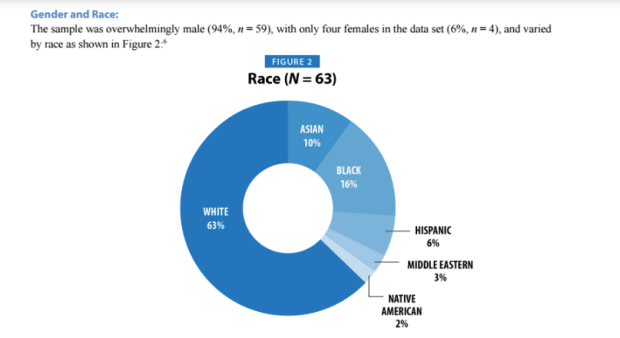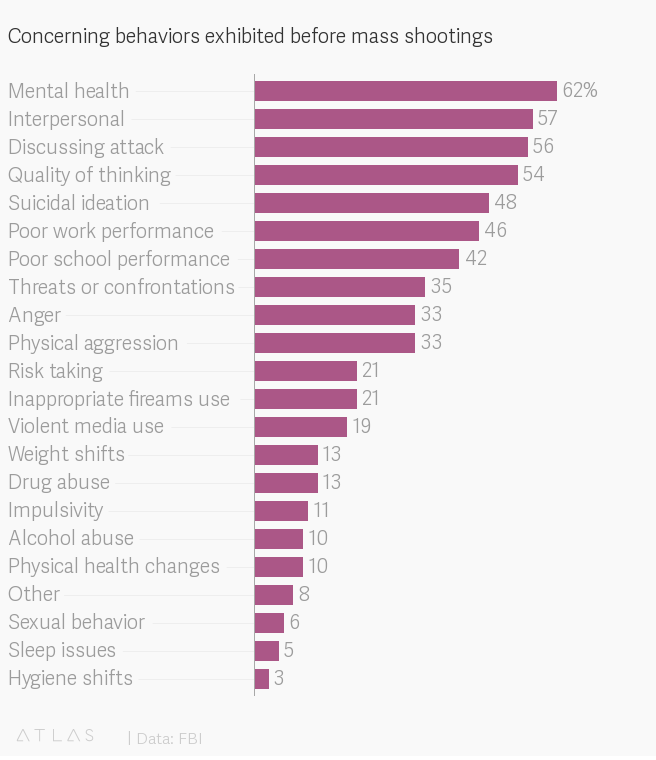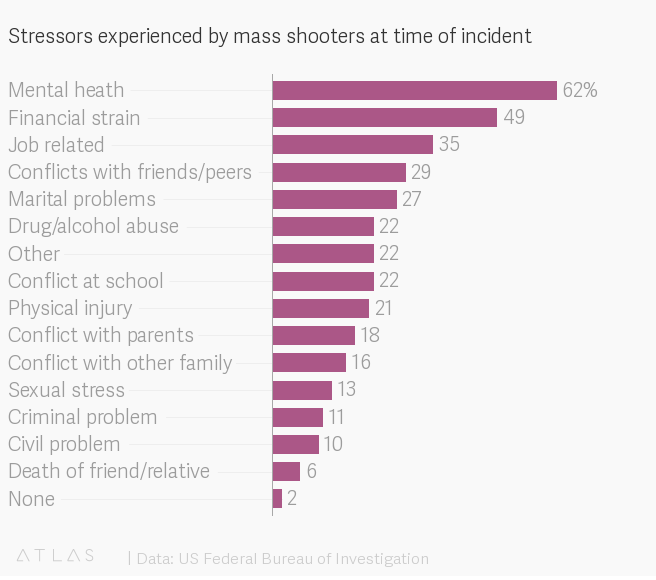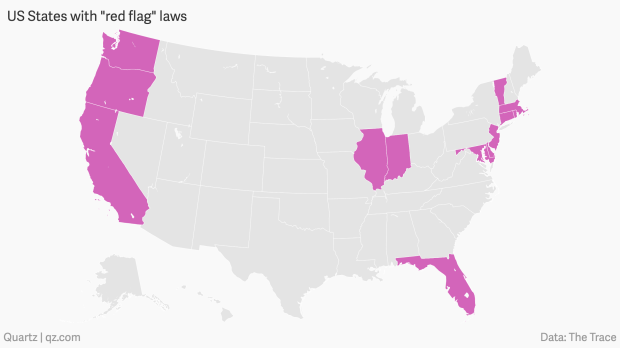
Family members are led into the Thousand Oaks Teen Center where families have gathered after a deadly shooting at a bar on Thursday, Nov. 8,2018, in Thousand Oaks, Calif. AP Photo/Richard Vogel
Here’s the FBI’s Warning Signs of a Mass Shooter
A prior arrest. Unmarried. A history of abusive behavior. Oh, and 94% are men.
For years, law enforcement, anti-terror experts, and emergency responders have been compiling information on who commits mass shootings in the US. Because such shootings are so frequent, there’s plenty of data to collect.
Their reports show that active shooters often share characteristics and exhibit similar behavior in the weeks and months before an attack. This behavior can signal impending violence, but is rarely reported to law enforcement, and when it is often the attacks still occur.
The behavior of Ian David Long, the gunman who killed 12 people in a bar in Thousand Oaks, California last week, fit that pattern. A 28-year-old former Marine, he had allegedly physically assaulted his high school track coach, got into screaming matches with his mother so severe the police were called, and grew more volatile after a motorcycle accident left him unable to work out. He also, of course, had easy access to a gun and ammunition.
The Trouble With Single Men
In June, the FBI published “A Study of the Pre-Attack Behaviors of Active Shooters in the United States.” The study examines 63 active shooting incidents in the US between 2000 and 2013, in an attempt to identify “those who may be on a pathway to deadly violence.”
In it, a single demographic data point clearly distinguishes American mass shooters from other citizens: 94% were men. In a separate FBI study published in April 2018, analyzing 50 active shooter incidents between 2016 and 2017, all shooters were male.
Most active shooters were also either single (57%) at the time of shooting, or divorced or separated (22%).

According to the June study, mass shooters are mostly white (63%), but that is in line with the 60% of the US population that identifies as white and non-Hispanic.
Abuse, Harassment and “Concerning” Behavior
Beside being male and single or divorced, most shooters had “concerning behavior” in common: abuse, harassment, bullying, and sometimes violence.
The FBI found that a third of mass shooters had been convicted of a crime as an adult (35%). Nearly two-thirds of active shooters (62%) had a history of acting in an “abusive, harassing, and oppressive way,” says the June report, including incidents of “excessive bullying and workplace harassment.”
About one in five shooters (16%) had engaged in “intimate partner violence,” and 11% exhibited behavior that could be considered “stalking.”
The shooters in the study exhibited an average of 4.7 examples of “concerning behavior” before their attacks.

Most shooters (77%) spent a week or more planning their attacks, during which time they exhibited some of these concerning behaviors. And more than half of the shooters exhibited “leakage,” the FBI notes, a term for discussing the idea of committing a violent act with someone else.
The people most likely to notice “concerning behaviors” are the people who know the potential shooter best, the FBI notes, either family, friends, or classmates. Often they don’t mention to concerning behavior to anyone who could help, or to anyone at all.
Yet those people are also likely targets: An analysis of nearly 160 mass shootings between 2009 and 2016 by gun control advocacy group Everytown found that gunmen shot their intimate partner or family member in more than half the cases (54%). (The organization defines “mass shooting” as one in which four or more people were killed, not counting the shooter.)
Grievance and Stress
In June this year, the US Department of Justice’s research arm produced a report on the current uptick in US homegrown terror (including mass shootings as well as violent attacks attacks using explosives and vehicles). That report agrees with the FBI’s findings that American mass shooters tend to share certain traits—no matter what their motivation.
Homegrown US terrorists “frequently combined personal grievances (ie. perceptions that they had been personally wronged) with political grievances (i.e., perceptions that a government entity or other political actor had committed an injustice),” the report found.
In particular, “feeling that one (or one’s group) has been treated unfairly, discriminated against, or targeted by others may lead individuals to seek justice or revenge against those they blame for this situation,” the report notes.
Sometimes these people can be pushed to violence by the words of others, either by radical online groups or the hostile political discourse, law enforcement officials warn. In the case of Long, the Thousand Oaks shooter, there’s little in the way of an online footprint, though he did post some taunting messages to Instagram after he started shooting. But the man who sent pipe bombs to prominent Democrats and the shooter who killed 11 in a Pittsburgh synagogue both appeared to have been inspired by radical right-wing voices.
The FBI’s June report also showed that active shooters had, on average, 3.6 “stressors,” or things in their life causing them stress, at the time of the shooting. These ranged from financial problems and mental health issues to the death of a relative:

Mental health is not synonymous with a diagnosis of mental illness, the FBI notes. Instead, it indicates that the shooter has appeared to have been struggling with an issue like depression or anxiety in the year before the attack. Just 25% had ever been diagnosed with any sort of mental illness before the attack.
“There is no single warning sign, checklist, or algorithm,” to identify a mass shooter before an attack, the FBI notes. Instead, there’s a “complex combination of behaviors and interactions with bystanders” in the weeks or months leading up to the attack that could identify potential shooters.
Disarming Violent Men
Conspicuously missing from the FBI and DOJ research on mass shooters, though, is advice on what Americans should do if they identify someone exhibiting these troubling characteristics.
That’s because even when communities, relatives, or police identify potential mass shooters, it is difficult to disarm them in the United States; lobby groups like the National Rifle Association have fought hard to prevent the passage of local laws that would take guns out of men’s hands.
Most mass shooters obtain the firearm they use legally. About 40% buy it especially for the attack and another 35% already possess the weapon, FBI research shows. Only 13 US states have “red flag” laws that allow police to take legal weapons from people who are determined to be threats to themselves or others.

Federal gun laws have been weakened in recent years too. One of Donald Trump’s first actions as president was to overturn Obama-era regulations that made it difficult for people with severe mental illness to buy handguns.
But the battle isn’t over yet. Several Democrats who won office in last week’s midterm elections ran specifically on a platform of tougher gun laws, which means that it could be easier in coming years to take guns away from people who are identified as dangerous.
The FBI has over 50 field offices and an online “tip line” where you can report suspected terrorism or criminal activity.




